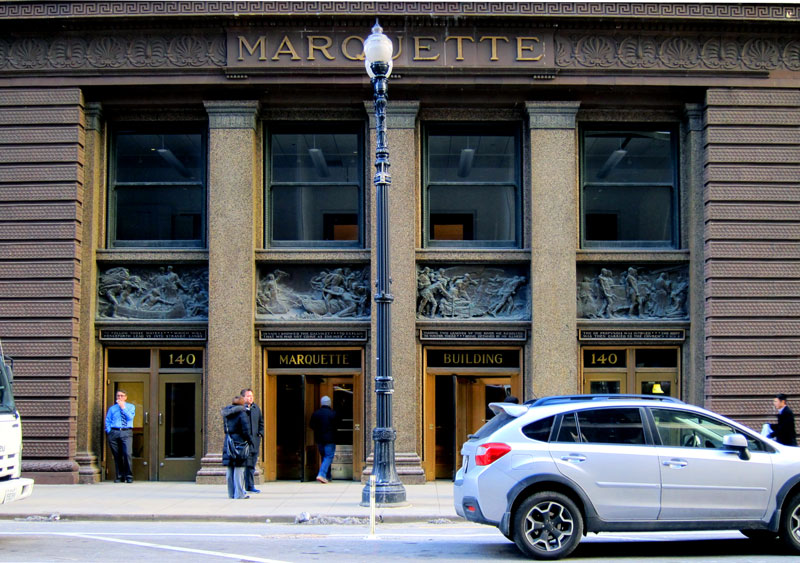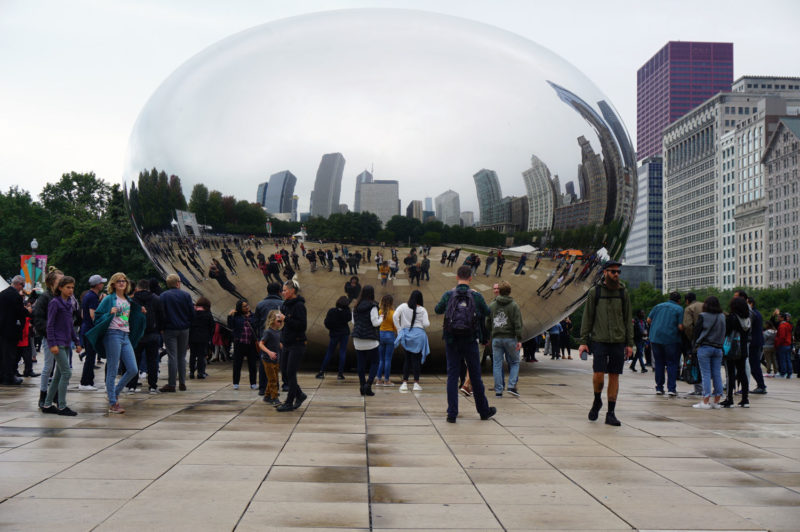 I am waiting at the bus stop on the way to the dentist. I am directly opposite the old Marquette Building, with its amazing brickwork (if can you call it that when all the bricks are unique to the building itself) and its distinguished old bronze story-boards, with their glorious patina of greenish-grey.
I am waiting at the bus stop on the way to the dentist. I am directly opposite the old Marquette Building, with its amazing brickwork (if can you call it that when all the bricks are unique to the building itself) and its distinguished old bronze story-boards, with their glorious patina of greenish-grey.
I am seldom here, at this bus stop, at any hour. It isn’t too pleasant to be here today, when the wind-chill is again way below zero, and my companions at the stop are shifting anxiously, scanning for a sign that the bus is coming.
In the meantime, I look at the people standing in front of the Marquette, planted there in defiance of winter. I am amazed at the hardiness of the smoker, puffing away in his shirt-sleeves, and the other nonchalant folk, hatless, chatting comfortably as though they hadn’t a worry. Each moment I remain at the stop, I feel more desperate to get in out of the painful cold.
I decide to fish out my camera and take a picture, knowing that as soon as I do the bus will come.
In the photograph, the details of the bas-reliefs, showing Marquette‘s travails, can be seen more clearly. How strange it must have been to navigate these undeveloped regions in a canoe! Each panels show an episode in the young Frenchman’s explorations, which brought him to winter in these parts hundreds of years ago.
Beneath each panel is an explanatory text, some quoting the famous Jesuit himself. The first panel shows Marquette setting out ‘to explore those waters . . .which will henceforth lead us into strange lands.’
In the second panel, he stands in his canoe, raising aloft a calumet, or peace pipe, attempting to communicate good will to an attacking tribe.
The third panel has the text, ‘Passing two leagues up the river, we resolved to winter there . . . being detained by my illness.’ It shows a seated man, which I suppose to be Marquette, being hastily carried toward Chicago in a canoe. (Marquette wintered in Chicago in 1674-5, when he was suffering from dysentery. He died, at age 37, the following spring.) The final panel depicts his funeral, with “the de profundis [being] intoned” and Indians carrying a pallet with his remains.
So Marquette was Chicago’s very first casualty! From his time to the present, our winters have been synonymous with human suffering. To ‘resolve to winter there’ was a fateful decision indeed.
Click the image to enlarge.

harley says
I’m going to check out that building when the weather is warmer!! Your descriptions of the bas-reliefs are fascinating! I knew that Marquette was an early explorer of this area, but wow–1674–that is amazing! Amazing that he undertook such a hazardous journey into such a wild and then very primitive area. . . . The smokers: yes, I have seen a few very brave ones, taking a quick one outside in this horrid cold weather.
Celia says
Somehow, standing in present-day Chicago on a very cold day helped me appreciate the greatness of Marquette’s achievement. His name is ubiquitous in the Midwest but still never really impressed me. But to think of what it would be like to stumble around this region in frigid weather hundreds of years ago, when it was strange and unsettled–that really brought home to me how truly great he was.
I gather that Marquette came to the Great Lakes via the St Lawrence seaway, then traipsed all over WI and IL, and explored most of the way down the Mississippi and back, before contracting dysentery at Starved Rock and, many months later, giving up the ghost. I think his was every bit as great as Lewis and Clark’s adventure.
P.S. The Marquette Building lobby is open to the public and well worth going in to, because it has beautiful stained-glass panels inside. I think they were designed by Tiffany.
The bas-relief panels on the exterior were designed by a sculptor named Herman A. MacNeil.
KW says
Nice post, Celia! It has been atrociously cold, hasn’t it!
The Marquette Building is a real treasure; and yes, the jewel-like lobby is not to be missed.
Celia says
It is truly bone-chilling. Thank goodness we’ll soon be saying good-bye to February! Thank you, KW.
KW says
It is taking a lot of “resolve” to winter here these days!
Celia says
I’ll say.